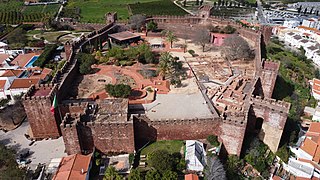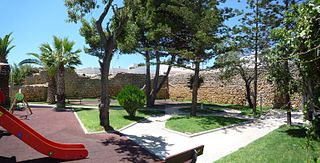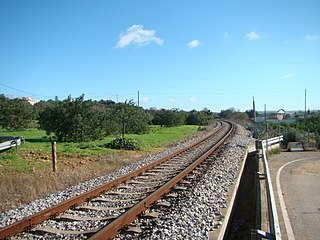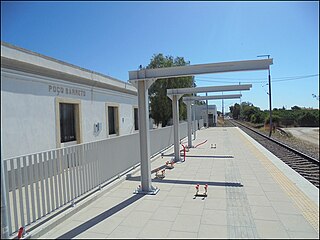Related Research Articles

Silves is a city and municipality in the Portuguese region of Algarve, in southern Portugal. The population of the entire municipality of Silves in 2011 was 37,126, in an area of 680.06 km2. The urbanized area of the city proper has approximately 11,000 inhabitants. Silves is the former capital of the Kingdom of the Algarve (1249–1910), a nominal kingdom within the Kingdom of Portugal (1139–1910), and is of great historical importance.

Faro District is the southernmost district of Portugal. The area is the same as that of the Algarve region. The administrative centre, or district capital, is the city of Faro. It borders Spain.
Diogo de Silves is the presumed name of an obscure Portuguese explorer of the Atlantic who allegedly discovered the Azores islands in 1427.

Silves or Ilha de Silves is an island municipality in the state of Amazonas, northern Brazil. It is located 10 km straight line north or about 40 km by water from the Amazon River, 200 kilometres (120 mi) east of Manaus. Its population was 9,230 (2020) and its area is 3,749 square kilometres (1,447 sq mi).

The Castle of Silves is a castle in the civil parish of Silves in the municipality of Silves in the Portuguese Algarve. It's believed that the first fortifications were built upon a possible Lusitanian castro, by the Romans or Visigoths. Between the 8th and 13th centuries, the castle was occupied by the moors who expanded it, making it one of the best preserved Moorish fortifications in Portugal, resulting in its classification as a National Monument in 1910.

The Silves Cathedral is a former cathedral in the city of Silves, in the Algarve region of southern Portugal. A mosque, built during the Moorish rule of the Iberian Peninsula, was originally located in its current place, and was later mostly restructured and converted into a Catholic cathedral after the Reconquista. Although having some Baroque characteristics, it is mostly Gothic in nature and it is considered to be the main Gothic monument in the Algarve and one of the most important landmarks in southern Portugal. It was classified as a national monument on June 29, 1922.

The Taifa of Silves was an Arab taifa kingdom that existed in what is now southern Portugal for two distinct periods: from 1027 to 1063, and again from 1145 to 1150, when it was finally conquered by the Almohad Caliphate.

The Castle of Alvor is a medieval castle in the civil parish of Alvor, in the Portuguese district of Faro: considered to be a significant military monument associated with the nearby Castle of Silves.
Deutsche Schule Algarve (DSA; Portuguese: Escola Alemã do Algarve is a German international school in Silves, Algarve, Portugal. It serves grundschule until grades 11–12.
Silves Futebol Clube is a Portuguese football club from Silves in the Algarve and playing in the Algarve Football Association's league in the Portuguese District Championships, in the fourth tier of the Portuguese football league system.

Linha do Algarve is a railway line in the region of Algarve, in southern Portugal, which connects the stations of Lagos to the west and Vila Real de Santo António to the east of the Portuguese region.

Mexilhoeira is a closed halt on the Algarve line in the Lagoa municipality, Portugal. It is part of the section from Silves to Ferragudo, which opened on 15 February 1903.

Lameira is a closed halt on the Algarve line in the Silves municipality, Portugal. It is part of the section from Algoz to Poço Barreto, which opened on 19 March 1900.

Sobrado is a closed halt on the Algarve line in the municipality of Silves, Portugal. It is part of the section from Algoz to Poço Barreto, which opened on 19 March 1900.

Ferragudo is a halt on the Algarve Line in the Lagoa municipality, Portugal. It was opened on 15 February 1903, under the name Portimão. After the construction and opening of the Portimão Railway Bridge and station, in 1922, the name was changed to Ferragudo.

Estômbar-Lagoa railway station is a railway station on the Algarve line which serves Lagoa Municipality and is located in Estômbar, Portugal. It opened on 15 February 1903.

Poço Barreto is a halt on the Algarve Line in the Silves municipality, Portugal. It was opened on 19 March de 1900, and served as terminus for the railway line until 1 February 1902, when the section to Silves was opened.
The Almohad Caliphate launched a major offensive against the Kingdom of Portugal in the spring of 1190 that lasted into the summer of 1191. The Caliph Yaʿqūb al-Manṣūr crossed over from Africa to take personal command of his forces. The campaign of 1190 was underwhelming because of assistance Portugal received from passing armies of the Third Crusade. The sieges of Tomar, Santarém and Silves had to be abandoned, but the caliph overwintered in Seville. The campaign of 1191 reversed Portugal's recent reconquests, captured Silves after a second siege and pushed the frontier north to the Tagus.
The Alvor massacre took place in June 1189 during the Third Crusade, when a fleet of crusaders from the Holy Roman Empire, Denmark and the County of Flanders stormed the castle of Alvor in the Algarve, then part of the Almohad Caliphate, and massacred 5,600 people. The place of the conquest and massacre of Alvor in the Portuguese Reconquista is unclear, but there are grounds for thinking that it was part of the strategy of King Sancho I, who launched a siege of Silves a month later.

The siege of Silves was an action of the Third Crusade and the Portuguese Reconquista in 1189. The city of Silves in the Almohad Caliphate was besieged from 21 July until 3 September by the forces of Portugal and a group of crusaders from northern Europe on their way to the siege of Acre. The defenders capitulated on terms, the city was handed over to Portugal and the crusaders took a portion of the spoils.
References
- ↑ "Silves a Portimão". Gazeta dos Caminhos de Ferro (in Portuguese). 16 February 1903.